
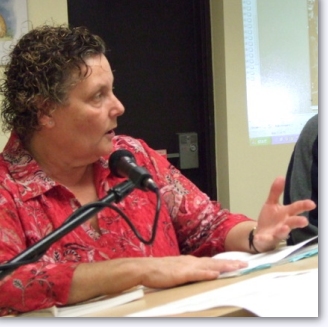 I
have spoken to over 6,000 students about my books and have been
on CBC radio, CTV television and interviewed in numerous newspapers.
I love an audience!
I
have spoken to over 6,000 students about my books and have been
on CBC radio, CTV television and interviewed in numerous newspapers.
I love an audience!
I am available to do a
variety of workshops on writing and on the topics covered in
my books. All of the workshops offered are interactive, intense,
and interesting. Workshops can range from one hour sessions,
to half day or full day. There is more time to do in depth study
in longer sessions.
Contact me at
for more information, prices and duration of my author visits.
I can give custom made programs that will fit your group's age,
numbers, curriculum, focus, and interests. I am also available
for virtual visits.
For a discounted author
visit, see the National Public Readings Program at The
Writers' Union of Canada.
SCHOOL VISITS & WORKSHOPS
 HOLOCAUST/WORLD
WAR II PRESENTATION:
HOLOCAUST/WORLD
WAR II PRESENTATION:
BOOKS - GRANDPA PROMISED, THE RIGHTEOUS SMUGGLER
Workshops and talks for
schools, libraries, and other groups focusing on the Holocaust,
World War II, anti-Semitism, racism, intolerance, and bullying.
I use age appropriate
description especially since I am dealing with sensitive material.
I do not want to frighten the children.
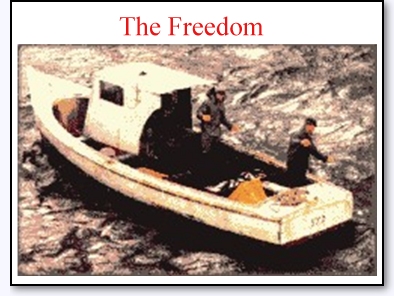 I
use power point and do an interactive multi-media presentation
using music and slides to introduce children to the difficult
topic of the Holocaust. I talk about each slide and do some
readings from the books.
I
use power point and do an interactive multi-media presentation
using music and slides to introduce children to the difficult
topic of the Holocaust. I talk about each slide and do some
readings from the books.
I engage the children in
discussion by asking them questions while I am presenting. At
the end of the talk, I encourage the children to ask me questions
on the topics of the Holocaust, my books and the writing process.
Humourous example: During
a talk on World War II, there was a black-out in the school.
I went with the situation and told the children that during
war time, people had to put up heavy dark curtains and sit inthe
dark just like they were doing, so that the bomber pilots would
not see their light and bomb them. This realty hit home and
the students were entranced.
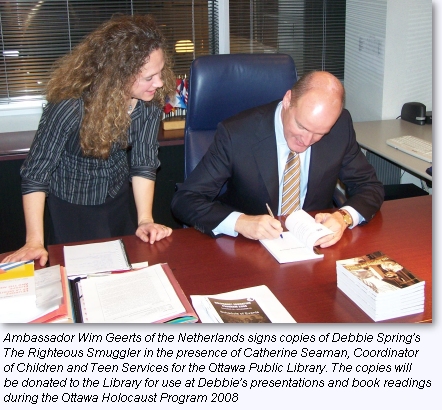
 ADVERSITY AND
DISABILITY PRESENTATIONS:
ADVERSITY AND
DISABILITY PRESENTATIONS:
BOOK - THE KAYAK
WRITING ABOUT WHAT YOU KNOW
My protagonist in THE KAYAK is in a wheelchair. In my presentation,
I will relate my personal experiences of not being about to
walk on three occasions:
 As a child I broke
my ankle skating
As a child I broke
my ankle skating
 When I was a tween,
I broke my ankle downhill skiing
When I was a tween,
I broke my ankle downhill skiing
 While sparring
in karate, I wrecked my knee and needed knee surgery
While sparring
in karate, I wrecked my knee and needed knee surgery
TEACHING DISABLED PEOPLE
Instructing disabled people was good research for my book. I
teach:
 Land yoga to people
in wheelchairs.
Land yoga to people
in wheelchairs.
 Water yoga, water
pilates, aqua stretch and aqua fit to disabled people, clients
with
Water yoga, water
pilates, aqua stretch and aqua fit to disabled people, clients
with
diseases, and as rehabilitation.
RESEARCH VOLUNTEERING TO GET FIRST HAND
INFORMATION
For research, I volunteered at CARD (The Community Association
for Riding for the Disabled) for therapeutic riding.
 I will talk about
my experience as a sidewalker and how I incorporated my
I will talk about
my experience as a sidewalker and how I incorporated my
research into the book.
SETTING
Research also includes the setting of the book:
 I will talk about
the importance of accuracy and understanding the setting of
your
I will talk about
the importance of accuracy and understanding the setting of
your
novel.
 I have kayaked
and camped in Killbear Provincial Park where the story takes
place
I have kayaked
and camped in Killbear Provincial Park where the story takes
place
giving me first hand knowledge about the
Georgian Bay area.
THE VALUE OF SHORT STORY WRITING
I will discuss the importance of writing short stories:
 How the short story
of THE KAYAK was the seed to my novel
How the short story
of THE KAYAK was the seed to my novel
 The technique of
using short stories as an outline for a novel
The technique of
using short stories as an outline for a novel
BOOK - BREATHING SOCCER
One of my workshops is
about adversity, disabilities, fitting in, achieving goals through
positive thinking, and choosing role models.
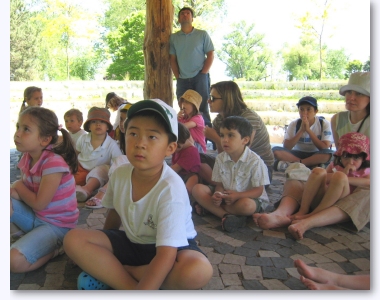 I
read excerpts from the book. During my talk, I relate my own
experiences as an asthmatic, and make the connection with my
protagonist, who had to overcome many obstacles with her asthma
in order to play soccer and have a normal life. I bring in an
Epi Pen and asthma spray puffer to show the kids.
I
read excerpts from the book. During my talk, I relate my own
experiences as an asthmatic, and make the connection with my
protagonist, who had to overcome many obstacles with her asthma
in order to play soccer and have a normal life. I bring in an
Epi Pen and asthma spray puffer to show the kids.
I show how a role model
can have a positive influence on people from all walks of life.
In the book, my protagonist chooses her role model to be Canadian
Olympic rower Silken Laumann, who had a terrible accident and
was told that she could never compete again and ended up winning
the Bronze medal for Canada.
I talk about winning and
losing. I ask the children pertinent questions like, "Does
losing make you a loser? Can you grow and learn from losing?
What happens if you always win?"
I incorporate drama into
the workshop and have the students act out a scene. A powerful
example from the book is when her soccer coach won't let Lisa
play, even though her teammate is begging to come off because
she is exhausted.
I end the workshop with
question and answer.
 YOUNG ADULT PRESENTATION:
YOUNG ADULT PRESENTATION:
BOOK - SCREWED
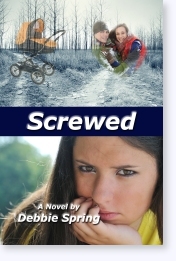 In
this workshop students will learn to write for the older teen
audience and keep them captivated. The focus will be writing
on mature topics. We will talk about what topics teens want
to read about, what other books are out there, and censorship.
In
this workshop students will learn to write for the older teen
audience and keep them captivated. The focus will be writing
on mature topics. We will talk about what topics teens want
to read about, what other books are out there, and censorship.
I will discuss and use examples from my novel
SCREWED a Young Adult novel that deals with teen pregnancy with
a female and male perspective.
 PICTURE
BOOK PRESENTATION:
PICTURE
BOOK PRESENTATION:
BOOK - WILMA THE WILD
WHITE WHALE
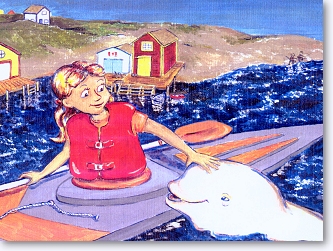 For
young children, during my picture book presentation, I read
from the book and show the pictures. Then I tell the true story
of how I met Wilma the beluga whale and my real life adventures
with her, including kayaking with her, swimming and riding on
her back! I use an underwater theme as we chant, sing songs,
play games, and draw pictures. I do a question and answer period
at the end.
For
young children, during my picture book presentation, I read
from the book and show the pictures. Then I tell the true story
of how I met Wilma the beluga whale and my real life adventures
with her, including kayaking with her, swimming and riding on
her back! I use an underwater theme as we chant, sing songs,
play games, and draw pictures. I do a question and answer period
at the end.
For older children interested
in the art of writing picture books, I read selections from
the book and talk about writing about "what you know".
I explain how to do research
on whales. I bring up the topic of belugas as an endangered
species and what we can do to help. I take questions at the
end.
 WRITING TECHNIQUES
WORKSHOP:
WRITING TECHNIQUES
WORKSHOP:
SHORT STORY - THE KAYAK
I teach students about
writing techniques such as character development, setting, pacing,
point of view, writer's block and research.
In my workshop, students
learn, practice and fine tune their writing by participating
in writing exercises, reading their works-in-progress to the
group and dramatizing their stories.
Topics covered include:
 |
Where
do authors get their ideas from? |
 |
Story
creation and structure. |
 |
Editing
and revision. |
 |
Types
of writing: different age groups, genres. |
 |
Researching stories and writing about what they know. |
 |
I lead group
discussions and analyze each work-in-progress making sure
that it has a strong beginning, middle, and end. |
 |
I
engage the students to ask questions designed to help the
writers:
 Does
the story move along? Does
the story move along?
 Do the characters
move the story forward? Do the characters
move the story forward?
 Are there
setbacks and obstacles facing the characters? Are there
setbacks and obstacles facing the characters?
 Do things
get worse before they get better? Do things
get worse before they get better?
 Does the
writing lead up to the climax of the story? Does the
writing lead up to the climax of the story?
|
[top]
